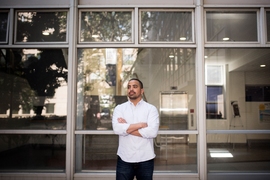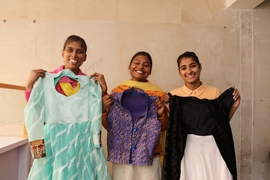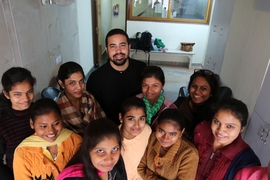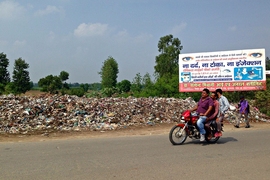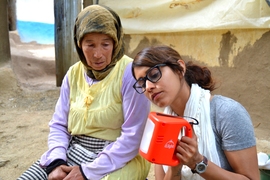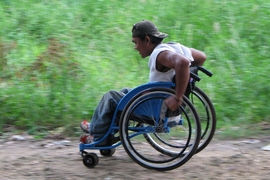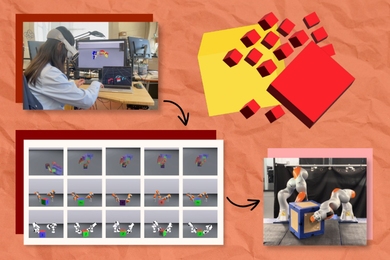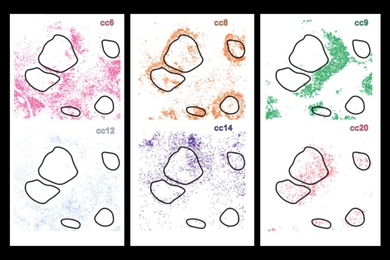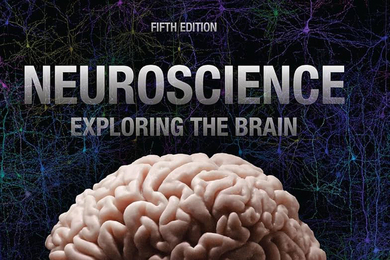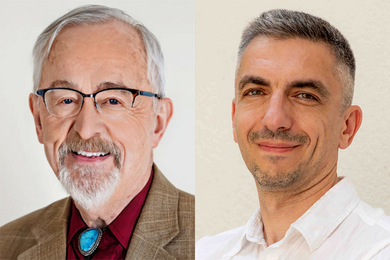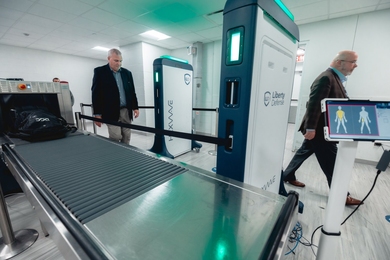Cauam Cardoso was only 17 when he decided to break from family tradition and pursue engineering instead of the arts, a move that set him on a path to working with communities in need.
Over the past decade, Cardoso, a PhD student in international economic development at MIT, has helped communities on five continents overcome infrastructure issues such as a lack of sanitation, while always following the advice his dad gave him growing up: “You have two ears and one mouth for a reason, so listen more than you talk.”
Experiencing problems, finding solutions
Cardoso grew up in Rio de Janeiro, Brazil, in a poor neighborhood that bordered a slum, or favela. While his family always had enough to get by, he saw many problems right in his own backyard.
“I always felt very bothered by that reality,” says Cardoso. “Growing up, seeing the lack of sanitation, being harassed by the police, the racial discrimination.”
Cardoso, who comes from a family of artists, instead found himself drawn to engineering, which he saw as a tool he could use to help communities such as his own.
Cardoso attended the Federal University of Santa Caterina, in Florianópolis, Brazil, where he majored in civil engineering with a concentration in sanitary and environmental engineering. During his second year of college, he and a friend started the Serrinha Project, an effort to improve sanitation in a nearby favela where issues with garbage collection meant that trash was often piled on the streets.
“I saw that with some technical skills I could make a difference here and help prevent the situation from escalating,” says Cardoso. “Of course I was just one kid at 19, no money, no nothing, and not even an engineer yet, but that was my rationale.”
After talking to the waste management company, Cardoso realized the issue wasn’t a shortage of trucks, but rather that the company didn’t understand how to navigate the physical environment of the favela. Cardoso came up with a simple fix: He mapped the entire favela, indicating where the garbage trucks could pass through, and where narrow streets required garbage pickup on foot or by tractor. Cardoso also worked with the neighborhood association and a local primary school to increase community awareness about garbage collection.
After completing his bachelor’s degree, Cardoso wrote about his four years working on the Serrinha Project for the World Bank Essay Competition, and won. Suddenly he had the opportunity to travel the world and the validation he needed to think even bigger with his work.
Thinking bigger
Soon Cardoso found himself working on sanitation once again, this time in Angola, which was trying to rebuild itself after a long civil war. Cardoso immediately began getting to know the community where he was working, an effort that was aided by the fact that he, like most Angolans, speaks Portuguese, and comes from a biracial background.
“Over time, because I spent a lot of time in the field going to places that even many of the government officials didn't know,” he says. “I learned not only the environment very well, but how to speak the same language, so there was an openness to me.”
Cardoso spent his first year in Angola with a public waste management company, gathering information about current garbage collection routes and how they could be improved. With few resources, Cardoso often had to get creative — at one point he spent 24 hours driving a garbage route and taking photos to record when garbage was being collected and how quickly it was accumulating. His second year in Angola, Cardoso worked with a private company, where he implemented business practices such as hiring tests for garbage collectors and an employee kitchen to help workers eat better.
His work in Brazil and Angola made Cardoso realize that there was more he needed to learn to better understand the problems he was seeing around him.
“What engineering gave me was a very important set of tools for me to be able to solve problems in a technical way,” he says. “But I didn't understand the structural factors that were contributing to that particular environment, like why you have so many people living in poverty, why you have such inequality, why you have infrastructure that doesn't work in one place but works in others.”
A quest for more knowledge
Intent on filling in his knowledge gaps, Cardoso moved to Australia, where, after a four-month crash course in English, he enrolled in a master’s program in political economy at the University of Sydney. It was during a summer of volunteer work in Cambodia that Cardoso met his future wife, a twist of fate that sent him back to Cambodia after finishing his degree, where he worked with the Food and Agriculture Organization of the United Nations to help local communities improve their food security.
A year later, Cardoso moved to the U.N. headquarters in Rome, where he was privy to the high-level funding decisions that eventually trickle down to the local level. The experience, along with a chance meeting with the late MIT professor Alice Amsden, who taught a class he was taking, motivated Cardoso to apply to a PhD program at MIT.
“In theory you have all these projects, all these amazing things that are supposed to happen, but they don't, the execution doesn't work out,” says Cardoso. “And I was like, I have to understand that pattern.”
Combining theory and practice
At MIT, Cardoso has embraced the opportunity to combine theory and practice, while also working to understand the growing role of technology in communities worldwide. Cardoso, who works with Bish Sanyal, the Ford International Professor of Urban Development and Planning, has mainly been involved in a project called the Comprehensive Initiative on Technology Evaluation, or CITE.
“The idea is one simple technology can have this huge impact on someone's well-being,” explains Cardoso. “But today there are a lot of technologies out there such as solar lanterns or water filters, and there's no way to systematically evaluate what works and what doesn't work on the ground.”
With CITE, Cardoso and the project’s other team members are working to develop an objective methodology to assess the usefulness of various technologies. To assess a product, CITE focuses on three main categories: suitability (does the technology work properly?), scalability (can the technology actually reach the consumers?), and sustainability (will the technology create a long-lasting impact, and will the business model supporting it survive long-term?). For the past five years, Cardoso and the rest of the CITE team have been organizing pilot studies all over the world, from solar lanterns in Uganda to water filters in India, and now they are in the process of compiling their results and developing the best methodology.
CITE has also teamed up with the Self-Employed Women’s Association of India (SEWA), which felt it lacked a systematic way of assessing the technologies it was delivering to the local community. CITE is supporting SEWA members as they learn how to create and administer their own technology evaluations. This past winter break, Cardoso traveled around India and conducted 24 focus groups involving 230 people, in an effort to understand different SEWA operations, and with support from the MIT Priscilla King Gray Public Service Center he will be returning to India this summer. For Cardoso, working with SEWA is all about helping the organization become self-sufficient as it figures out how to address the problems it faces using the available resources.
During his time at MIT, Cardoso has also had the opportunity to teach his own undergraduate course, an Introduction to International Development. Cardoso redesigned the course syllabus to reflect his background, and draws heavily on his own experiences in the field to engage his students.
“Leading my own course and directing the students was probably one of the most rewarding experiences I had at MIT,” says Cardoso, who received his department’s 2016 Outstanding PhD Teaching Assistant award. “I love teaching, and I take it very seriously. You learn so much from the students — it's really a gift.”
Beyond MIT
After finishing his PhD, Cardoso plans to stay in academia, while remaining involved in many real-world projects. In particular, he is committed to continuing his work in Brazil.
No matter what happens, Cardoso will stay flexible and open-minded about his future, an attitude that has allowed him to travel the world while helping communities in need, and even led him to meet his wife.
“As you're developing your career, life happens, and you have to be open to that, otherwise you're missing out on so much,” he says. “I truly believe that your commitment to make social change and make the world better should also be a commitment to your personal happiness. It has to be a balance between the two.”
